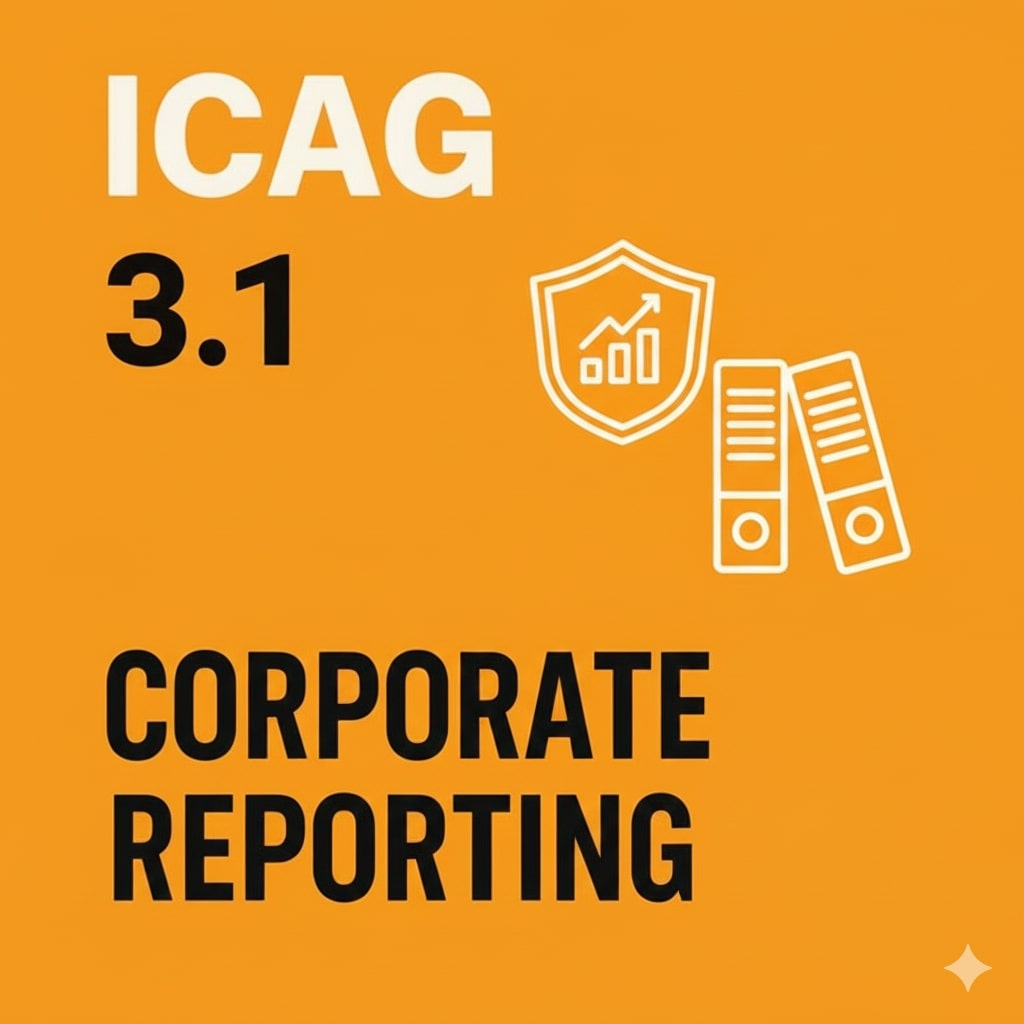The Corporate Reporting module (Paper 3.1) is part of the Professional Level (Level 3) in the ICAG professional qualification syllabus. It builds on foundational concepts from the Skills Level, particularly Financial Reporting, focusing on applying appropriate judgement and technical competence in the preparation and interpretation of financial statements for complex business entities, evaluating and communicating the impact of current issues and developments in corporate reporting, and addressing sustainability, ethics, and specialized transactions.
Below is the syllabus coverage in tabular form, including main topics and their approximate weightings (guiding study time and exam mark allocations).
| Syllabus Topic | Description | Weighting (%) |
|---|---|---|
| A. Application of International Financial Reporting Standards | Select and apply appropriate accounting standards for a private entity. Assess the choice of accounting treatment that may be adopted based on a given scenario explaining how they may affect a user’s understanding of a business. Prepare extracts of relevant financial statements for a private entity based on International Financial Reporting Standards (IFRS). Advise on the appropriate accounting treatment of events and transactions in accordance with relevant IFRS. Relevant areas of application of IFRS include: Leases; Employee benefits; Share-based payments; Fair value measurement; Income taxes; Related party disclosures; Provision, contingent liabilities and contingent assets; Financial instruments; recognition, measurement, presentation and disclosures (including hedge accounting and derivatives); Operating segments; Earnings per share; Construction contracts; Accounting and reporting by retirement benefit plan; Financial reporting in hyperinflationary economies; Interim financial reporting; Investment property; First time adoption of IFRS; Insurance contracts; Regulatory deferral accounts. All International Financial Reporting Standards covered in 2.1 Financial Reporting are also applicable and examinable in 3.1. Evaluate how alternative choices of revenue recognition, asset and liability recognition and measurement can affect the understanding of the performance, position and prospects of an entity whether in the private or when presenting consolidated or single entity financial statements. Explain to a chosen user the application of IFRS and local requirements for a private entity. | 30 |
| B. Preparation of financial statements for a group | Identify from a given scenario a subsidiary, associate or joint venture according to international standards and local regulation. Prepare consolidated financial statements arising from existing, new or discontinuing activities or interests in subsidiaries, associates or joint ventures in accordance with IFRS. Prepare consolidated financial statements involving parent and one or more subsidiaries and/or associate or joint venture: Consolidated statement of profit or loss and other comprehensive income; Consolidated statement of changes in equity; Consolidated statement of financial position; Consolidated statement of cash flow. Prepare extracts from the financial statements of an entity preparing consolidated financial statements undertaking a variety of transactions on the basis of chosen accounting policies and in accordance with IFRS and local regulations. Explain with examples the additional information that may be included in annual reports beyond financial statements in accordance with international best practice and local requirements including management reports, risk information, governance reports, financial summaries, key performance indicators and highlights. | 25 |
| C. Evaluate entity position, performance and prospects using a range of financial and other data | Calculate suitable performance, position and prospect measures using key indicators, financial statement ratios, comparisons, trend analyses and other representations of relationships that support a meaningful financial and business analysis of a private entity. Recognise and comment on the limitations of analysis. Exercise professional scepticism and judgement when considering sources of data and information. Draw conclusions and report on the analysis undertaken from a business perspective. | 15 |
| D. Specialized transactions | Advise organisations on the process, legal requirements and accounting for capital reorganisation schemes, with particular reference to: Designing a capital reduction scheme; Implementing a capital reduction scheme; External reorganisation (reconstruction). Perform business valuation for initial public offer, mergers and acquisition. Advise relevant organisations on specialised accounting requirements for industries, including mining, insurance, manufacturing and banking. | 15 |
| E. Environmental, social and governance issues, including sustainability reporting, ethical problems and contemporary issues | Discuss the background to the development of sustainability reporting and the role of the following: The Task Force on Climate-related Financial Disclosures (TCFD); The Global Reporting Initiative (GRI); The International Sustainability Standards Board (ISSB); The Sustainability Accounting Standards Board (SASB). Advise organisations on the relevance of sustainability reporting. Identify the sustainability issues in a given industry. Explain and apply the provisions of the IFRS Sustainability Standards. Demonstrate an awareness and insight into contemporary accounting issues, appropriate to a professional in the accounting discipline. Critically discuss the impact of integrated reporting: Discuss the role of the International Integrated Reporting Council (IIRC); Describe the requirements of the Integrated Reporting Framework; Describe the factors that contribute to the successful implementation of Integrated Reporting, including integrated thinking within an organisation. Advise an organisation on how to apply the requirements of the Integrated Reporting Framework and the changes required to existing accounting practices. Explain the fundamental concepts of value creation, the capitals and the value creation process. Advise on the impacts, benefits and risks of technological developments within corporate reporting, including the use of big data and data analytics, distributed ledger technology and blockchain. Recognise ethical dilemmas and recommend and justify appropriate courses of action. |


